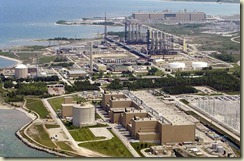 Does America Online still exist? Why, yes it does, though it seems to have changed its business model considerably – it isn’t supporting the CD-manufacturing industry all by itself anymore, for one thing. It also has an energy site, at which we learn:
Does America Online still exist? Why, yes it does, though it seems to have changed its business model considerably – it isn’t supporting the CD-manufacturing industry all by itself anymore, for one thing. It also has an energy site, at which we learn:The headlines should come somewhere between December and March 2012 when the Nuclear Regulatory Commission, if all goes as expected, will okay building up to four new nuclear reactors.The story following is notably positive.
The licenses for two Westinghouse AP1000 reactors at Southern Co.'s Plant Vogtle in Georgia, followed quickly by two more at SCANA's Summer station in South Carolina, will be the first granted since the 1970s.
One plus for new nuclear is new jobs. Both the Vogtle and Summer sites will employ thousands of construction workers, as well as hundreds of operational personnel when the units start up 2016-19. Fertel said that, while the largest reactor components have to be forged overseas since no facilities exist in the US, most of the multi-billion dollar projects are sourced here.And stays fairly positive even with a peek in from the Union of Concerned Scientists. Worth a read.
---
While Vogtle and Summer will be the first new reactors in awhile, they won’t be the first new nuclear generation in North America:
Ontario nuclear power company Bruce Power said it had loaded the final uranium fuel bundle into the 750-megawatt Unit 1 at the Bruce A nuclear power plant in Ontario.
And this is the plan:
Bruce said in a release it expects to attach 750-MW Unit 2 to the Ontario power grid early in the first quarter of 2012 and start commercial operation later in the first quarter.
Bruce expects to connect Unit 1 to the grid in the second quarter of 2012 and go commercial during the third quarter.
You just knew a Canadian nuclear facility would be called Bruce. I wonder if there’s another one called Kevin. In any event, Bruce 3 and 4 have already been operating while 1 and 2 were shuttered in the mid 90s when it was decided not to upgrade them. Decision reversed, apparently.
---
Too much good news:
Fukushima fallout: Renaissance in nuclear power generation now a long way off.
That’s the title of a story at the Financial Times. Surprisingly, the story is not as gloomy as that title and has to admit:
The two responses [Germany and Lithuania] are proof that while atomic power has experienced a serious setback in the wake of Fukushima, it remains a chosen source of energy for many countries.
So – can we have our renaissance back?
---
Goofy:
Like the various nation-states of the world, Google vs. Amazon are also approaching their own nuclear war: both technology titans will have such growing energy demands that they will have to consider nuclear energy. And so, the key to understanding the growth opportunity of these companies is to assess their ability to use nuclear energy, and to use nuclear energy to build an infrastructure for an exponential improvement in data transmission across the Internet.
Leaving aside the awkward nuclear war metaphor, this article at Seeking Alpha seems rather peculiarly premised. Writer Simit Patel doesn’t stop there, either:
On the uranium side of things, I would love to see Google and Amazon support the growth of US-based uranium producers leveraging ISR [in-situ recovery] technology -- particularly Uranium Energy Corporation, a favorite of mine in the market.
I just have no idea.
The Bruce facility on Lake Heron.
Comments
Congratulations to Bruce for a successful reload. :)